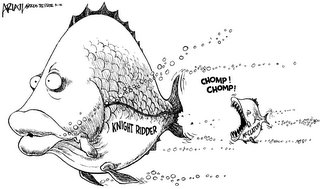McClatchy's good, but ...
Brad Warthen, editorial page editor at The (Columbia, S.C.) State, one of the K-R papers to be bought in the McClatchy deal, says he's still willing to take the paper off McClatchy's hands for up to $500 million. "When will you have the money? As soon as somebody gives it to me ... ("As great as is for McClatchy to own us, think how much better off it would be if I did. I'm sure you can see that.")
Some other observations from Warthen's column today:
- Most KR journalists, and probably most of the business side folks, too, have been crossing fingers, rubbing rabbits’ feet and otherwise doing all we could (which ain’t much) to ensure that McClatchy would be the buyer.
- And the analysts’ dire predictions? Well, if you took everything the Wall Street analysts know about the future of newspapers and converted it into high-quality chicken manure, you’d be better off, but you’d have to go to the store and buy another bag to have enough to fertilize a fig tree.
- On K-R's and McClatchy's profit margins of 20 to 23 percent overall: But that’s now, say the analysts. With all that competition online for the advertising dollar, they say, this can’t last. The gaping hole in that logic is that newspapers are also online, that our online ad revenues are climbing astronomically, and that we have an advantage competitors can’t match: an unrivaled franchise in local news — which has great appeal among customers our advertisers want — as an added inducement to come to our sites and see the ads. Our competitors either have no content, or much less, or content that you can find in a thousand other places.
- It would actually be a huge boost to our business if people suddenly did decide they don’t want their news printed on dead trees. That would leave us growing online, and would cut our operating expenses almost in half: We could take those gargantuan presses and create artificial reefs off the Grand Strand. No more newsprint and ink to buy by the trainload. No more delivery trucks; no more gasoline. No more waiting half the night from the time we’re done putting the news together to when it’s placed in your driveway. We would simply finish writing and editing, press a button, and you would have your news instantly. Which is actually how it works now, from our end — the fact that you don’t get it for hours after we press the button is purely a function of the fact that the market still wants a newspaper.
Here are some of the analysts' take on things from the Media Stock Blog.
The deal also brings to mind a quote the other day from "Doug" (no, not me), a caller from Jacksonville, Fla., to NPR's "Talk of the Nation." In explaining the speed of business, he said:

Technorati tags: journalism, newspapers
0 Comments:
Post a Comment
<< Home